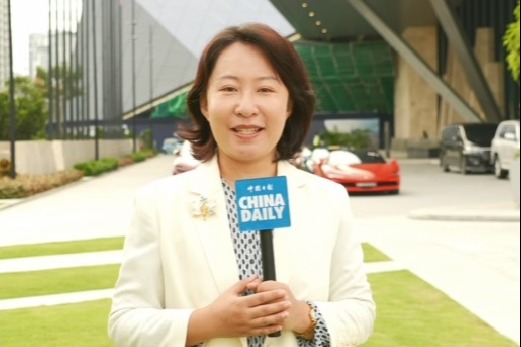Special program helps ensure education equity

Pang Zhongwang, a doctoral candidate studying instrument science and technology at Tsinghua University, has once again captured public attention with his heartfelt speech at the school's annual opening ceremony for new students.
His words, reflecting resilience, gratitude and ambition, have gone viral on social media, resonating deeply with netizens across the country.
"Tsinghua is big enough to accommodate everyone's imagination and possibilities," Pang told the audience of freshmen.
He recounted his own journey beginning in 2017, when he entered Tsinghua through a special enrollment plan for students from impoverished families and rural areas. He scored 684 on the national college entrance exam, or gaokao, and received an additional 60 points from the special policy.
Pang's story is a powerful example of how China's National Special Enrollment Program creates opportunities for students from less-developed regions. The program, which includes the National Special Plan, the University Special Plan and the Local Special Plan, has helped more than 1 million students from central, western and rural regions gain access to elite universities since its establishment in 2012.
The National Special Plan is designed to enroll students from formerly impoverished regions. The University Special Plan is similar, but specifically targets students from remote areas or regions where minority ethnic groups are dominant. The Local Special Plan aims to recruit rural students within their own provinces.
Pang, 26, was born into a family facing exceptional challenges in Wuqiao county, Hebei province. His father is unable to communicate with others due to illness, and his mother has a lower-body disability that makes mobility difficult. Pang himself was born with a congenital heart condition.
He spoke candidly about his initial uncertainties.
"When I first arrived at Tsinghua, I was excited but also a little lost," Pang said.
He received a piece of advice from a teacher that resonated with him: "Every student begins with a blank slate here. It's up to you to draw your future."
The idea inspired him to explore boldly and persevere through challenges.
"There were moments of self-doubt, but I learned to embrace the process. Getting up after falling down is part of who I am," he told People's Daily, crediting the unwavering optimism his mother has instilled in him since childhood.
Pang's devotion to his studies and determination to contribute to China's development led him to be named as one of the "People Who Moved China" by China Central Television in 2024.
Professor Li Liguo of Tsinghua's School of Education told Guangming Daily that the program has not only expanded access to high-quality education, but has also improved basic education standards in less-developed regions.
The number of students enrolled through the program has also expanded consistently, from 10,000 annually at its inception to more than 100,000 each year in recent years, Li said. The policy has greatly promoted educational equality, while graduates who received higher education through the program have in turn contributed to local development, he said.
Among them is Xiao Xiaogang.
Xiao, from a rural family in Lianyuan, Hunan province, was admitted to Tsinghua's electronic information program this year with a score of 689. His score qualified him even without the special enrollment plan, but he said it served as insurance.
He called himself a "small-town genius who is good at taking exams" and attributed his success to diligent preparation.
"I chose electronic information because it serves national strategic needs in areas such as communications and semiconductor chips," Xiao told China Daily. "I hope to contribute to the development of my hometown and the country in the future."
Xiao expressed great pride in his enrollment at such a prestigious university.
"Tsinghua is a sacred university for many students in the country, and being admitted here is also a dream-come-true moment for me," he said.
The expectations from his community back home, he added, serve as motivation rather than pressure.
Peng Ruohan, a beneficiary of the program from Jiangxi province, enrolled in the School of Agricultural Economics and Rural Development at the Renmin University of China with a score of 642. She said she would not have been admitted without the program, as 40 others scored higher than her on the gaokao but were not enrolled.
She described Renmin as her "dream school" and emphasized the program's role in promoting educational fairness.
"The special enrollment program offers a window for students from less-developed areas to see the broader world and acquire knowledge that can address their hometowns' challenges," she said.
For Peng, studying at Renmin represents intellectual and personal transformation.
"Higher education can reshape one's thinking — it's a spiritual elevation that changes your destiny," she said.
Over the next four years, Peng hopes to deepen her understanding of national policies and contemporary issues.
Renmin enrolled more than 130 students through its University Special Plan and around 300 through the National Special Plan, according to the university.
This year, Tsinghua's University Special Plan attracted 6,500 applicants — 1.8 times more than the previous year — and admitted 270, said Yang Fan, director of Tsinghua's admissions office. The National Special Plan at the university added another 280 students from rural or formerly impoverished counties, she said.
Yang reiterated the school's commitment to educational equity.
"Since 2011, Tsinghua has taken active measures to channel high-quality educational resources to rural and ethnic regions through targeted programs, supporting motivated students who aspire to serve the nation," she said.
Today's Top News
- China commemorates 80th anniversary of Taiwan's restoration
- China, US start economic, trade talks in Kuala Lumpur
- Support the UN for the 21st century
- Adapting to local realities fuels new quality productive forces
- World watches as China and US hold new trade talks
- Premier's tour set to deepen E. Asian ties
































